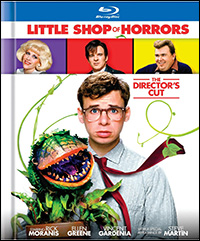
*
Who's that pert, sweet-voiced, apple-cheeked maiden giving a charming and knowing performance as Evelina, the spirited Northern lass wreaking havoc with moonlight and magnolia and runaway slaves in the live 1956 telecast of Harold Arlen and Yip Harburg's Bloomer Girl [Video Artists International]? Barbara Cook, that's who. Not the Barbara Cook who firmly established herself as leading lady of Leonard Bernstein's Candide and Meredith Willson's The Music Man; the slightly younger soubrette version, who had begun to attract fans with her performances as Ado Annie and Carrie Pipperidge in the 1953 and 1954 City Center revivals of Oklahoma! and Carousel, as well as providing doses of energy to the 1955 musical Plain and Fancy.
Cook makes an enchanting Evelina, as you might imagine. This "Producer's Showcase" production has other attributes well worth our notice. Bloomer Girl falls in that classification of all-but-lost musical comedy hits; it was seen as a worthy if secondary successor to Oklahoma! in its day, which was 1944. This not only because of the period flavor but due to the presence of a raft of Oklahoma! folk, namely choreographer Agnes de Mille; set designer Lemuel Ayers; costume designer Miles White; and two important Oklahoma! girls, Celeste Holm — the original Ado Annie — and comedic dancer Joan McCracken. Bloomer Girl had a tuneful score (if nowhere approaching the standards of Oklahoma!), some of Broadway's brightest costumes of the period, and sharp wartime relevance by virtue of the searing "Civil War Ballet."
But the show's blend of old-fashioned and in places quaint material — craftily cloaking the sly abolitionist/feminist/civil rights message — worked against the sort of mass popularity enjoyed by musicals such as Oklahoma! and Annie Get Your Gun. The resulting lack of a motion picture version — despite M-G-M's sizable investment in the show — moved Bloomer Girl into near-obscurity. A 2001 production at City Center Encores! demonstrated both the power of the score and the quaintness of the overall show.
Coming in between was the 1955 television version, which makes interesting and — thanks mostly to Cook — enjoyable watching. The live TV format necessitated severe cutting, taking the show down from what must have been in the 2:45 range to 76 minutes. Gone is a fair chunk of the score, although the more important numbers are retained. As for the book, it almost looks like time ran out and they slashed through the second act to the finale. Of great value, here, is the inclusion of de Mille's "Civil War Ballet." Before we discuss that, let us note that otherwise there isn't much choreography retained. We do get the "Good Enough for Grandma" dance, led by Daisy (Patricia Hammerlee), which features "grandma" doing her sewing and seems effective enough. There is also a bit of the "Uncle Tom's Cabin" Parade (though very little of the "Liza Crossing the Ice" sequence). Which leaves us with the monumental "Civil War Ballet," here led by de Mille dancers James Mitchell, Lidija Franklin, Emily St. Just, and Betty Low — the only original Broadway cast members participating in the TV version. This is authentic; it's hard to say whether it is full-length, but we certainly get a good idea of what it looked like. Lots of wives swooping, keening and more or less pining away while their men are off to war. It is thoroughly fascinating to watch, yes; but it doesn't seem to be very good. Perhaps this was caused by lack or rehearsal and/or not-ready-for-TV camera angles. In any event, I find it almost astounding; after hearing about the thing all these years, it certainly doesn't grab me.
Cook is, as indicated, well worth watching. Her leading man is played by Keith Andes, a road company Fred Graham in Kiss Me, Kate; he is best known for his one big Broadway break, as leading man to Lucille Ball in Wildcat. And we know how that turned out. Here, he turns out to be pretty likable. Comedy is handled by the aforementioned Hammerlee, who is okay albeit with her chores reduced, and Paul Ford as the blustering hoop-skirt manufacturer and Evelina's father. (Ford had just finished his two-year run starring as Col. Purdy in Teahouse of the August Moon.) An excessively weak showing is made by Rawn Spearman, who had appeared as Diahann Carroll's romantic interest in Arlen's 1954 House of Flowers. He seems suited to that show, at least on the original cast album, but all wrong here as the escaped slave, Pompey. Much better — and probably a better choice for the role in the first place — is Brock Peters leading "I Got a Song" (backed by Leon Bibb and Spearman). When Peters got his first starring role, in the 1961 Kwamina, his understudy was — Rawn Spearman.
While this television production doesn't reveal Bloomer Girl to be an all-time great, it certainly is informative and thereby recommended.
Visit PlaybillStore.com to check out theatre-related DVDs for sale.
 |
||
| Cover art |
*
 |
||
| Cover art |
Among the selections are George Lucas' "American Graffiti"; Bela Lugosi as "Dracula"; Kirk Douglas, Laurence Olivier, Charles Laughton and Tony Curtis in "Spartacus"; Kevin Costner in "Field of Dreams"; Spike Lee's "Do the Right Thing"; Steven Spielberg's "E.T. The Extra-Terrestrial"; Matt Damon in "The Bourne Identity"; Ron Howard's "Apollo 13"; Michael J. Fox in "Back to the Future"; John Hughes's "The Breakfast Club"; "Despicable Me"; Rock Hudson and Doris Day in "Pillow Talk"; and Robert Redford and Meryl Streep in "Out of Africa." Not the least of them is "All Quiet on the Western Front," Lewis Milestone's 1930 anti-war classic that still retains its power.
And there's more. Eight featurettes about various eras in the history of Universal; three vintage shorts from the 1930s; 14 vintage Universal cartoons; a music CD containing musical selections from Universal films (including Bernard Herrmann's "Psycho"); and a 75-page book offering a breezy and colorful chronicle of the aforesaid 100 years. *
 |
||
| Cover art |
Visit PlaybillStore.com to check out theatre-related DVDs for sale.
(Steven Suskin is author of "Show Tunes," "The Sound of Broadway Music: A Book of Orchestrators and Orchestrations," "Second Act Trouble," the "Broadway Yearbook" series and the "Opening Night on Broadway" books. He also pens Playbill.com's Book Shelf and On the Record columns. He can be reached at [email protected].)









